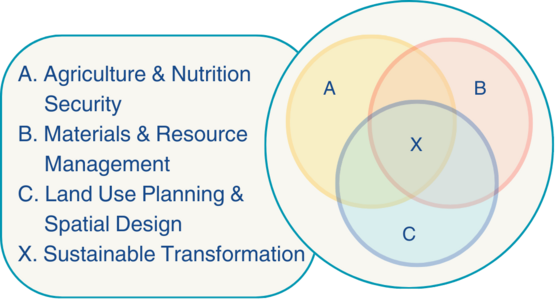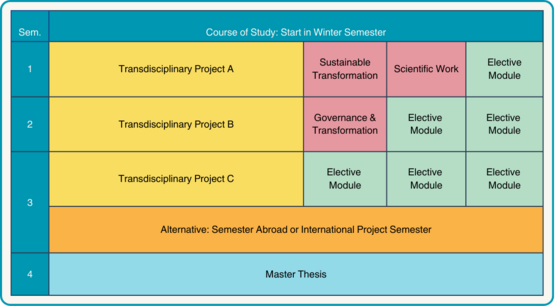Land Use Transformation (M.Sc.)
Master of Science
Characteristics of the Master's program Land Use Transformation
Starting in March 2026, this English-taught interdisciplinary Master’s program will explore current challenges and practical solution for the sustainable use of our land and its resources.
It is designed to develop globally minded problem solvers who can analyze complex questions in fast changing situations. Our graduates are equipped to make responsible decisions to shape sustainable landscapes for our future.
Our Program at a Glance
- Degree
Master of Science (M.Sc.)
- Program type
consecutive Master's program (full-time)
- Beginning of program
Summer semester (March) &
Winter semester (September)
- Standard duration
4 semesters
- Language
English
- Language requirements
English proficiency B2 level
- Location
Osnabrück – Campus Haste
- Admission restriction
24 students per year
- Cost
Semester fee, approx. 360 Euro
Detailed information
The new Master's degree program "Land Use Transformation" will start Summer Semester 2026 - pending final accreditation by the Accreditation Council (expected Summer 2025).
If you have any questions, please contact the degree program coordinator.
The Master's degree program Land Use Transformation is one-of-a-kind: No other degree program in Germany or neighboring countries explores this topic in the same way.
Unique interdisciplinary perspectives
Our program highlights the focus areas and intersections of Agriculture and Nutrition Security, Materials and Resource Management, and Land Use Planning and Spatial Design.
A balance of theory and practical content
Our modules, projects and labs are designed to link theory to case studies and real-world problems, imparting students with expertise that can be transferred directly to an international work environment.
Intensive training of intercultural and communication skills
Students gain lots of experience working together in small international groups, with counselling and support of experienced professors and lecturers. This is a perfect setting for a rich learning experience as well as for friendships that may last a lifetime.
Working together across disciplines, students develop their skills and gain hands-on experience in three large-scale group projects, centering real world problems of sustainable land use. Students can choose between one of two project topics, which vary each semester.
Example topics include:
- Resilient Landscapes - evaluating different forms of land use to optimize resilience, soil health and biodiversity
- Life Cycle Assessment - mapping the life cycle efficiency and environmental impact of products and/or value chains
- Communicating at the Nexus - what potential conflicts arise in communication at the interface between land planners and land users (e.g. farmers) and what strategies can help foster understanding and trust
Our curriculum offers students the freedom to chart their own course, according to their individual interests and experience.
In addition to the three large-scale Transdisciplinary Projects, all students must complete three required modules:
- Sustainable Transformation - a lecture series that offers insight into potential areas for specialization
- Scientific Work - a seminar that establishes expectations for scientific research methods and modes of communication
- Governance and Transformation - a seminar that provides an overview of the goals and policies surrounding climate change mitigation and land use, including the central players involved, the political economy logics of decision-making processes, as well as the drivers and conditions of transformation
Beyond these required modules, students develop their personal expertise by filling six elective modules with lectures and seminars from a catalog of 28 elective options. Our curriculum covers the following topic areas and their intersections:
Students may choose to spend their third semester studying or completing an independent project abroad. This option enables interested students to intensify their international exposure as well as their language proficiency and intercultural competencies beyond their experiences in Osnabrück.
More details on these two options can be found under Program Structure.
Our program focuses on preparing students for collaborative work at professional and disciplinary interfaces.
The knowledge, skills, and competences graduates acquire along their individual path through the curriculum qualify them for careers in:
- research institutions
- consulting and advisory services (climate management, water protection, biodiversity conservation, etc.)
- private companies in agriculture, food production or trade
- international planning offices
- public administration
- policy making
- NGOs
and more.
Students enrolled at Osnabrück University of Applied Sciences do not have to pay tuition, but they must pay semester fees of approx. 360 EUR each semester. The semester fees cover administrative costs, contributions to the Student Welfare Services, membership fees for the Students' Union and the cost of the semester ticket. The semester ticket entitles students to use the local buses in Osnabrück and regional train service throughout Germany at any time.
The cost of living in Osnabrück averages approx. 850-950 EUR per month, depending on personal needs and habits. This includes the costs of rent, health insurance, books, and other living expenses. The Center for International Students offers a more detailed breakdown of living expenses and upfront costs. To obtain a student visa and/or student residence permit, Germany requires foreign citizens to provide a financial statement that shows they have sufficient funds (934 EUR/month).
There are various possibilities for students to gain funding for their studies from state institutions, companies and foundations.
German Academic Exchange Service (DAAD)
The DAAD offers scholarships for foreign students and graduates. An overview over funding opportunities can be found here: German Academic Exchange Service (DAAD)
Osnabrück University of Applied Sciences: Scholarships, Foundations and other Financing Possibilities
The following website provides more information about scholarships and foundations as well as other possibilities for financing your studies: Scholarships and Financing Possibilities
Attractive, Historic & Affordable
With its green cityscape and historic city center, Osnabrück is an idyllic place to study. Sidewalks, designated bikepaths and a bus network connect its different neighborhoods. The city has a population of approximately 165,000 inhabitants, including nearly 30,000 university students. It is located in the middle of a UNESCO nature park and is just a few hours travel from many interesting bigger cities, like Amsterdam, Berlin, Cologne, and Hamburg.
Compared to other cities in Germany and in Europe, the cost of living in Osnabrück is relatively low, with affordable housing options such as privately organized student flat-shares or subsidized student accomodations through the Studierendenwerk Osnabrück. Our Housing Service is dedicated to helping international students find a place to live. Students also benefit from subsidized meals in the student dining halls. Like most of Germany, rates of violent crimes, theft and robbery here are relatively low in international comparison, making Osnabrück a safe and comfortable place to live.
Study with Us
Contact
Advice and Coordination
Shelby Long-Gräuler
Program Coordinator
Room: HC 0011
Phone: +49 541 969-5071
E-Mail: master-landuse@hs-osnabrueck.de

